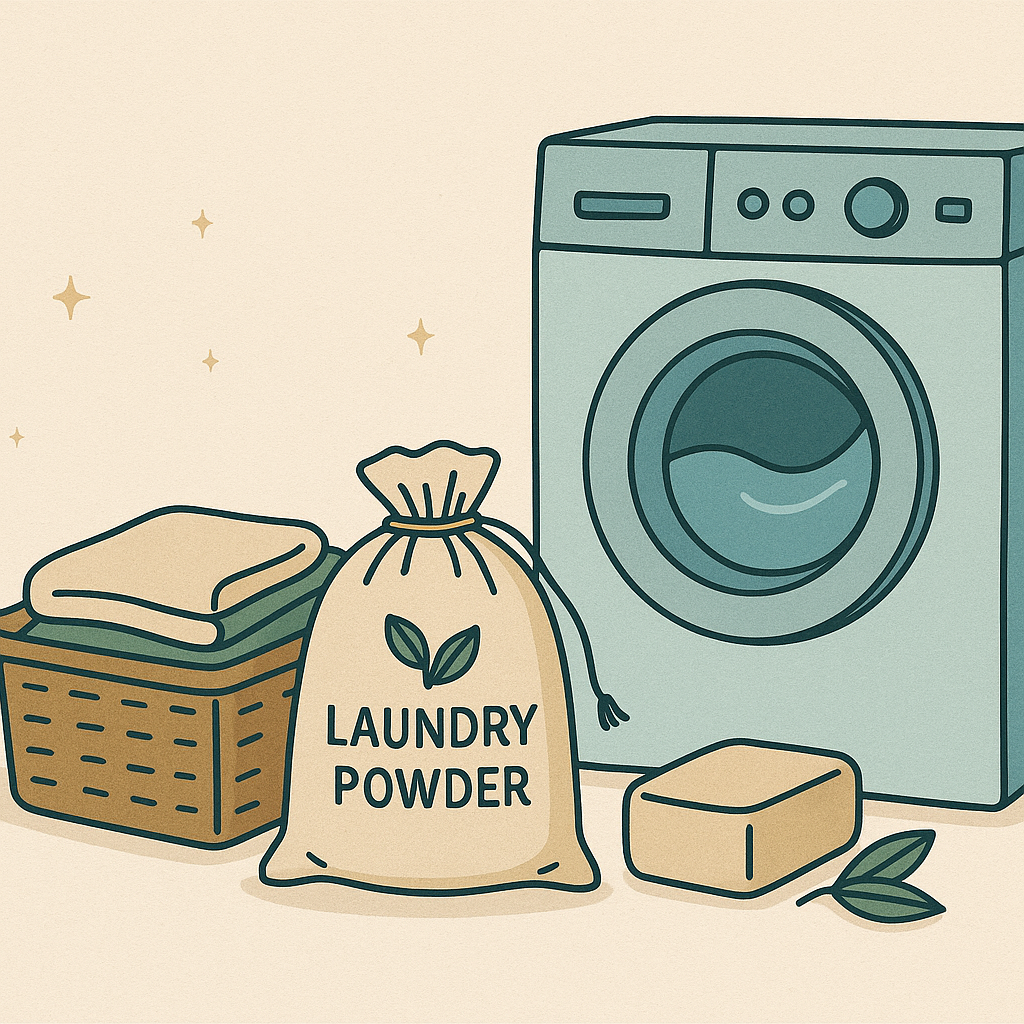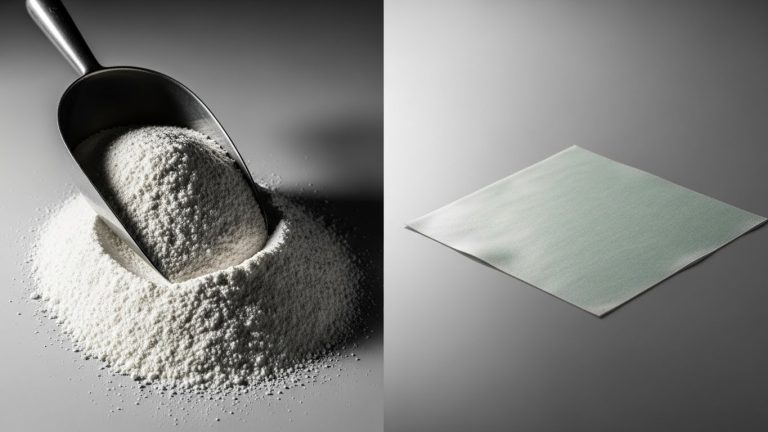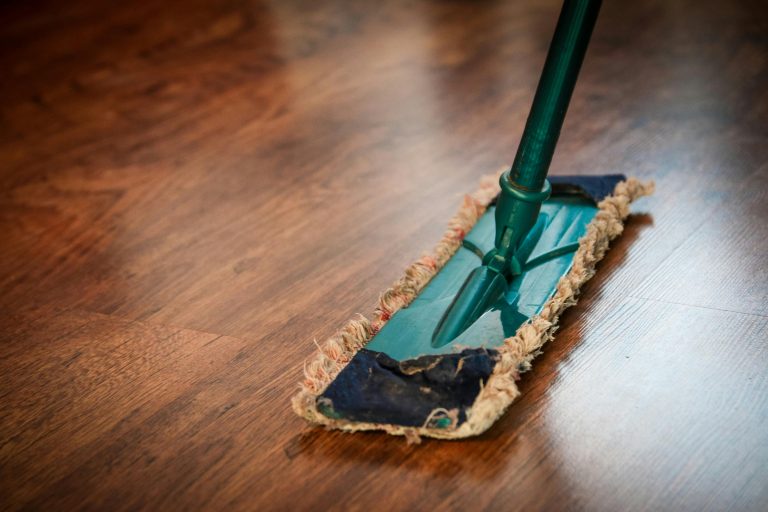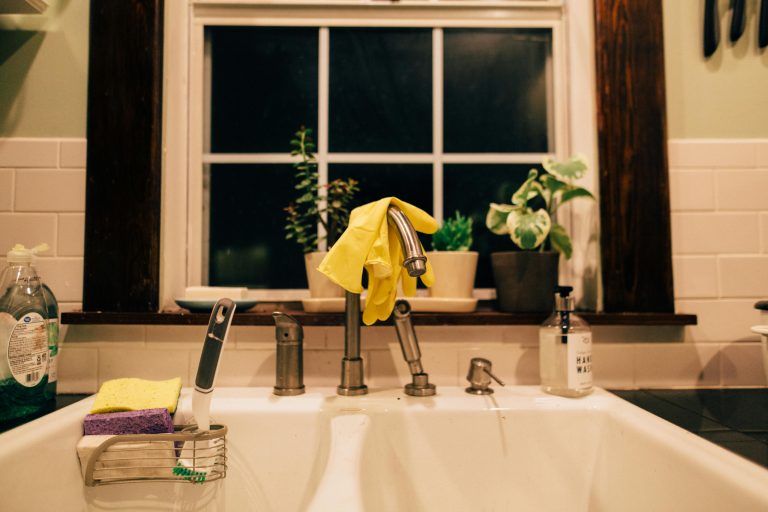A Zero Waste, Plastic Free Approach to Washing your Clothes
As I started down the plastic free journey that I’m on, one of the things that surprised me the most was how much plastic is involved in washing our clothes.
Nearly all of the laundry detergent that we use today has some form of plastic exposure in them. From the big plastic jugs of detergent to those little pods, it’ all adds up’s very hard to avoid.
Most of it ends up in landfills, or worse, in our oceans. But don’t worry! There are some products that have been coming to the market that provide consumers with plastic free and zero waste options to wash their clothes.
Below, we’re going to talk about how laundry creates plastic waste and then show you some awesome plastic free laundry detergent options.
Key Takeaways
- Your safest option is going to be purchasing laundry powder that comes in cardboard or concentrate that is packaged in cardboard.
- Most big brand laundry products often come in plastic packaging that’s bad for the environment.
- Detergent bottles, single use pods, laundry sheets, and even cardboard boxes with plastic linings add to plastic waste or their biproducts contribute to plastic polution.
- There are many great plastic free laundry detergent options out there, like powders, tablets, and bars.
- Even if you can’t find specific brands or plastic free options, there are still ways to reduce plastic when you do laundry.
- The type of clothing you wear has a large impact on plastic leaching into the environment when you wash your clothes.
Our Top Product Recommendations for Plastic Free Laundry Detergent
How does doing laundry contribute to plastic pollution?
It’s easy to overlook, but your laundry routine might be a bigger source of plastic pollution than you think. The way we typically wash our clothes involves a surprising amount of plastic, from the packaging of detergents to the clothes themselves. Let’s break down the main culprits:
Liquid Detergent in Plastic Containers
In the United States alone, the liquid laundry detergent market is estimated to be over $9B by 2032, accounting for approximately 32% of the laundry market.
This segment of the industry alone produces tens if not hundreds of millions of plastic containers that are generally disposed of once consumed. While these jugs are often made from recyclable plastic, the EPA estimates that only a small percentage actually get recycled.
Most end up in landfills, contributing to plastic waste that can take hundreds of years to decompose. Plus, shipping these heavy jugs, often filled mostly with water, increases the carbon footprint of laundry detergent due to greater emissions produced during transport.
Our recommendation is to avoid liquid laundry detergents to prevent single use plastics from being added to the environment, which will ultimately leach microplastics.
Plastic in Laundry Sheets – Polyvinyl Alcohol (PVA) Pollution
This is probably the most confusing and currently debated plastic related topic in the laundry industry today.
Laundry sheets, those convenient little squares promising clean and fresh-smelling clothes, seem to be the perfect zero waste, plastic free solution to wash your clothing, but they almost always contain Polyvinyl Alcohol (PVA), which is a product that is derived from fossil fuels and contributes to pollution of aquatic systems and our groundwater.
The Plastic Pollution Coalition has a great, in depth article that summarizes how PVA is understudied, but has links to harmful impacts on our environment and needs to be evaluated more. It requires specific circumstances for it to bio-degrade, which means it doesn’t degrade naturally on its own, and PVA has been found in deep sea creatures.
Using plastic free products as a consumer isn’t just about reducing microplastics in the environment, but making safer, healthier choices for your family and the environment. Given PVA is derived from fossil fuels and it’s been found to accumulate in our water systems and in marine animal, I would try to avoid these sheets as well. That being said, it appears that using these would be a better option than liquid detergent housed in single use plastics.
Single Use Detergent Pods – More Sources of Polyvinyl Alcohol
Detergent pods, with their pre-measured convenience, seem like a great idea. However, just like laundry sheets, they’re typically encased in a polyvinyl alcohol (PVA) film, a type of plastic.
While PVA is often marketed as water-soluble and biodegradable, studies have shown that it doesn’t always fully degrade in wastewater treatment plants. This means that detergent pods can contribute to plastic pollution in our waterways and oceans.
If you can, we recommending avoiding these single use pods to prevent the use of PVA. They also oftentimes come in plastic containers, where further contribute to plastic pollution
Lining Inside of Cardboard Containers
Laundry Powder that packaged in cardboard, metal or glass is going to to be our main recommendation for a plastic free, safe and environmentally friendly option.
That being said, even if you opt for powdered detergent, you’re not necessarily avoiding plastic. While the outer packaging might be cardboard, many powdered detergents come in boxes lined with plastic to protect the product from moisture. These linings are often not recyclable, meaning they end up in landfills. Plus, these boxes often have plastic components such as handles, pourers, and plastic scoops.
When looking for powdered laundry detergent, take care to review the packaging and try to find options that don’t come with any plastic components.
The Best Plastic Free, Zero Waste Laundry Detergent Options
Okay, so you’re ready to ditch the plastic and go zero waste with your laundry. Awesome! There are actually some really great options out there now, and they work just as well (if not better!) than the stuff you’re used to. It might take a little experimenting to find your perfect fit, but trust me, it’s worth it. Let’s dive into some specific brands and products you should check out:
Our Top Pick for an Affordable Solution: 365 by Whole Foods Market, Powdered Laundry Detergent
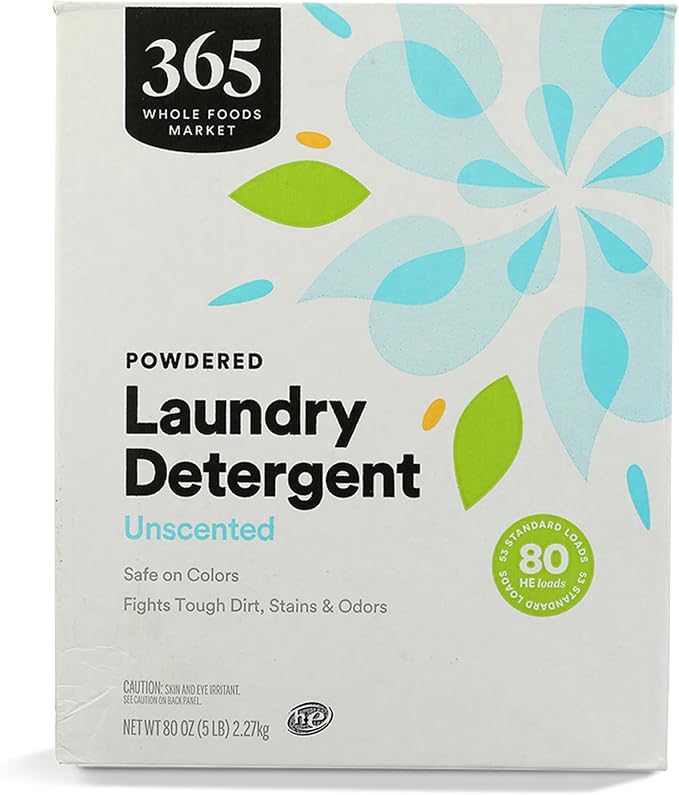
If you’re looking for a more accessible and affordable option, the 365 brand powdered laundry detergent from Whole Foods Market is a really good choice, and my top recommendation.
It comes in a cardboard box, which is a big plus, and it’s readily available at most Whole Foods stores. The 365 Laundry Powder is completely plastic and PVA free, it’s a high value, low cost solution for most people.
Our Runner Up: Meloria Laundry Powder
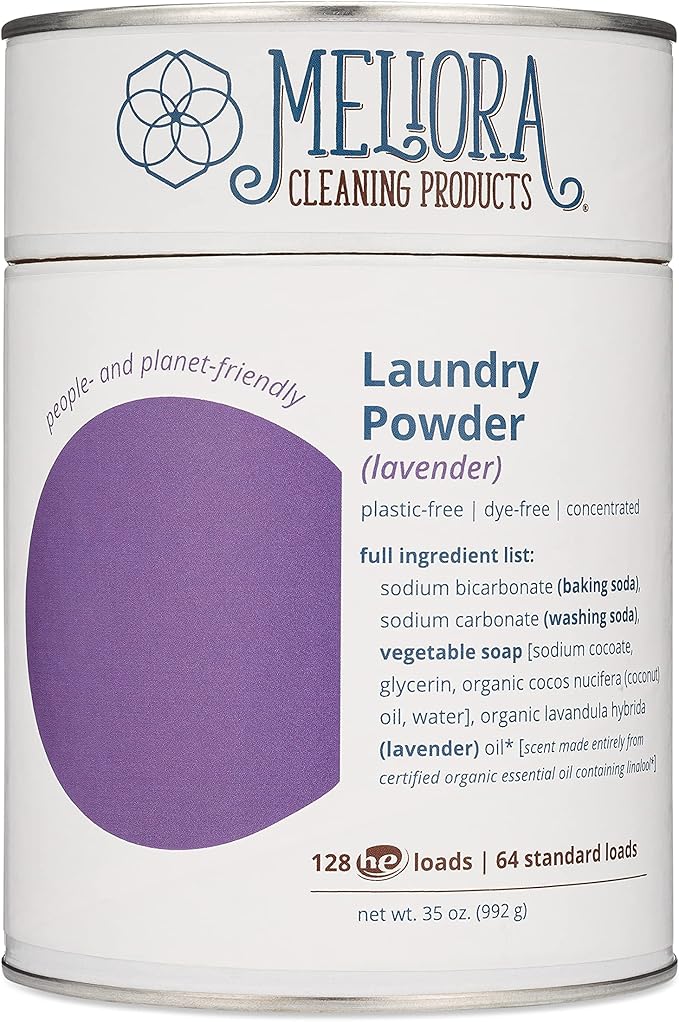
Meloria Cleaning Products is a fantastic brand that’s helping to pave the way of plastic free products.
Their effective laundry powder that comes in minimal packaging, and their focus is on using plant-based ingredients and avoiding harsh chemicals, which is a win for both your clothes and the environment. You can usually find it in a cardboard box or even a refillable container, depending on where you buy it. It’s a pretty concentrated formula, so a little goes a long way, making it economical too.
They have multiple different scented options that you can choose from, and are a strong choice for a zero waste, plastic free laundry detergent.
Blueland Laundry Detergent Tablets
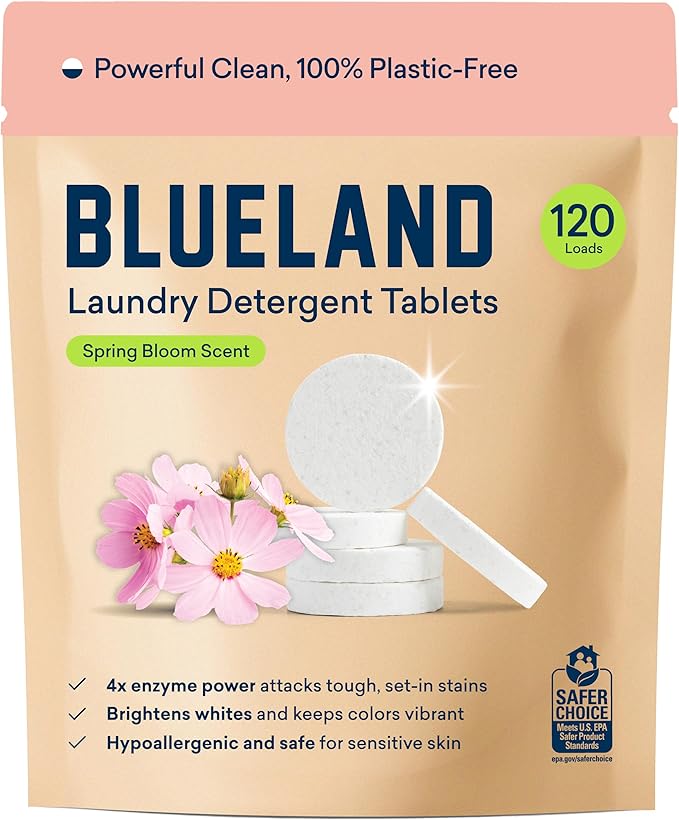
Blueland is making waves with their cleaning tablets, and their laundry tablets are no exception.
The idea is simple: you buy a reusable container once, and then just order refills of the tablets. They come in a compostable paper wrapper, so zero plastic waste! Plus, they’re super convenient to use – just toss one in the wash. I’ve found they’re great for everyday loads, and they smell pretty good too, without being overpowering.
I’ve personally found that the individual tablets don’t seem to be as effective as laundry powder, but you should try them out yourself and let me know what you think.
Tangie Laundry Bar Concentrate
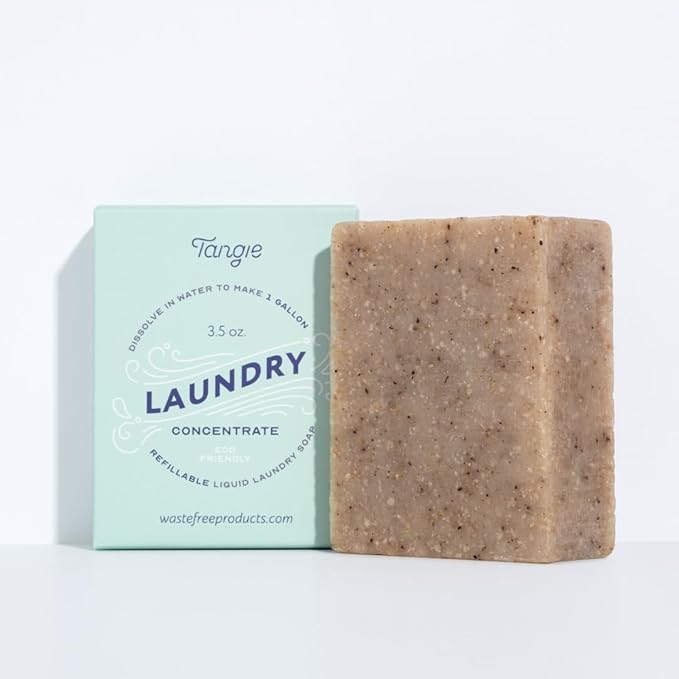
This is mildly a DIY option, but I personally love Tangie for their small, compact product that embodies the zero waste lifestyle.
The Tangie Laundry Bar is basically a concentrated bar of laundry detergent that you cut off pieces of, mix with water, and then use as your laundry detergent.
Once you get a few reusable glass bottles to mix in it, this is one of the best zero waste, plastic free laundry detergent options on the market.
Nellie’s Laundry Soda (Go with the Aluminum Tin)
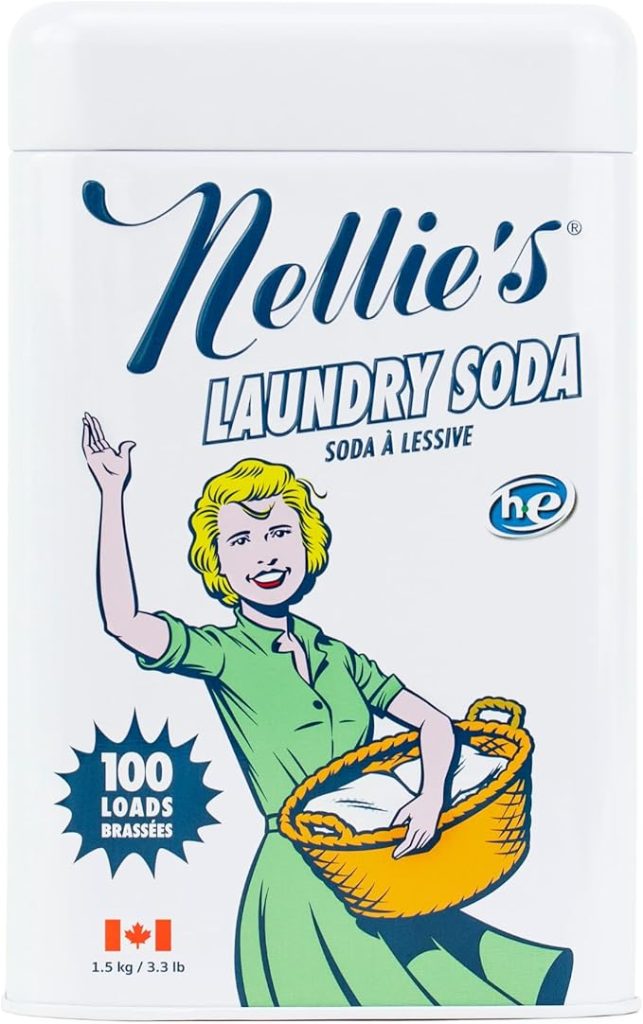
Nellie’s Laundry Soda is a classic for a reason. It’s a highly concentrated powder that’s super effective at cleaning clothes. They have a gentle formula that fragrance free and has a long standing history in the market.
The key here is to get the one that comes in the aluminum tin, not the plastic tub!
The tin is reusable and recyclable, making it a much better option. A lot of people swear by Nellie’s for its cleaning power and its simple, no-nonsense formula. It’s a bit more expensive upfront, but the tin lasts a really long time.
What should I buy if I can’t access any of these options?
Okay, so you’ve checked out the recommended brands, but maybe they’re not available in your area, or the shipping costs are just too high. Don’t worry; you still have options for reducing plastic in your laundry routine. The goal is to minimize plastic use as much as possible, even if you can’t eliminate it completely.
Here’s what you can do:
- Buy in Bulk: If your local store carries laundry detergent in bluk, consider buying the biggest size available. While it’s still plastic, buying in bulk reduces the overall amount of plastic used per load of laundry. Think of it as a compromise.
- Refill Programs: See if any stores near you offer detergent refill programs. Some co-ops or natural food stores allow you to bring your own container and refill it with detergent, fabric softener, or other cleaning products. This is a great way to avoid single-use plastic altogether.
- DIY Laundry Detergent: Making your own laundry detergent is surprisingly easy and can be very cost-effective. Recipes often involve simple ingredients like washing soda, borax, and soap flakes, which can often be found in cardboard boxes or paper bags. Just be sure to do your research and use safe, effective formulas.
Even small changes can make a difference. Switching to a more concentrated detergent, using cold water for washing, and air-drying your clothes can all help reduce your environmental impact.
Conclusion
So, you’ve seen how simple it can be to switch up your laundry routine. It’s not about being perfect right away, but about taking those first steps. Every little change you make, like picking a plastic-free detergent or hanging your clothes to dry, really adds up. You’re not just cleaning your clothes; you’re helping the planet, too. Give some of these ideas a try, and you’ll probably feel pretty good about it. Your clothes will be clean, and you’ll be doing your part to cut down on waste. It’s a win-win, really.
Frequently Asked Questions
What exactly is zero-waste laundry detergent?
Zero-waste laundry detergent is simply any kind of laundry detergent that doesn’t leave behind any packaging waste or product waste after you’ve finished using it. Regular laundry soaps often come in plastic bottles, which end up in landfills. Zero-waste options, on the other hand, use natural materials that are either reusable or biodegradable.
Does doing laundry really add to plastic pollution?
Yes, it absolutely does! Think about all those plastic jugs of laundry detergent. In the U.S. alone, people throw away about 700 million of them every single year! Even though you can recycle them, only about 30% actually get recycled. And even then, the plastic loses some of its strength each time it’s recycled, so new plastic has to be added. This all adds up to a lot of plastic waste.
Where does the plastic in laundry come from?
Many regular liquid detergents come in big plastic jugs that are a huge source of plastic waste. Also, some laundry sheets have plastic in them, and even cardboard detergent boxes can have a plastic lining inside. Plus, those handy single-use detergent pods are often made with plastic too.
Are there good plastic-free laundry detergents available?
Absolutely! There are some great plastic-free options out there. You can find laundry powders like Meloria, tablets from brands like Blueland, and even laundry bars from Tangie. Nellie’s Laundry Soda comes in an aluminum tin, which is a good choice, and 365 by Whole Foods Market also offers a powdered detergent.
What if I can’t find any of the recommended plastic-free options?
If you can’t find those specific brands, don’t worry! You can often find washing machine powder in bulk, or look for brands at your local supermarket that come in completely plastic-free packaging. You could even try making your own laundry soap at home.
What are some other ways to make my laundry routine more eco-friendly?
For drying clothes, you can use a clothesline with stainless steel or bamboo pegs. In colder weather, a wooden drying rack placed near a heat source works well. For stains, try sunlight, eucalyptus oil, regular soap, or washing soda. You can also use a reusable lint brush instead of sticky rollers and a razor to remove pills from your clothes.

